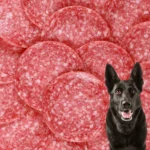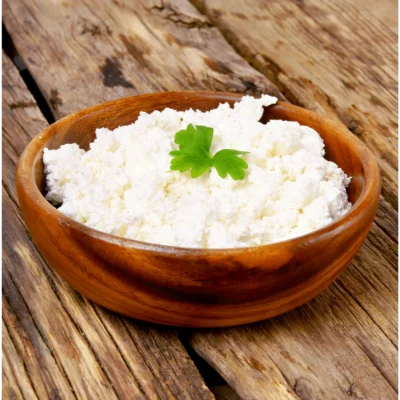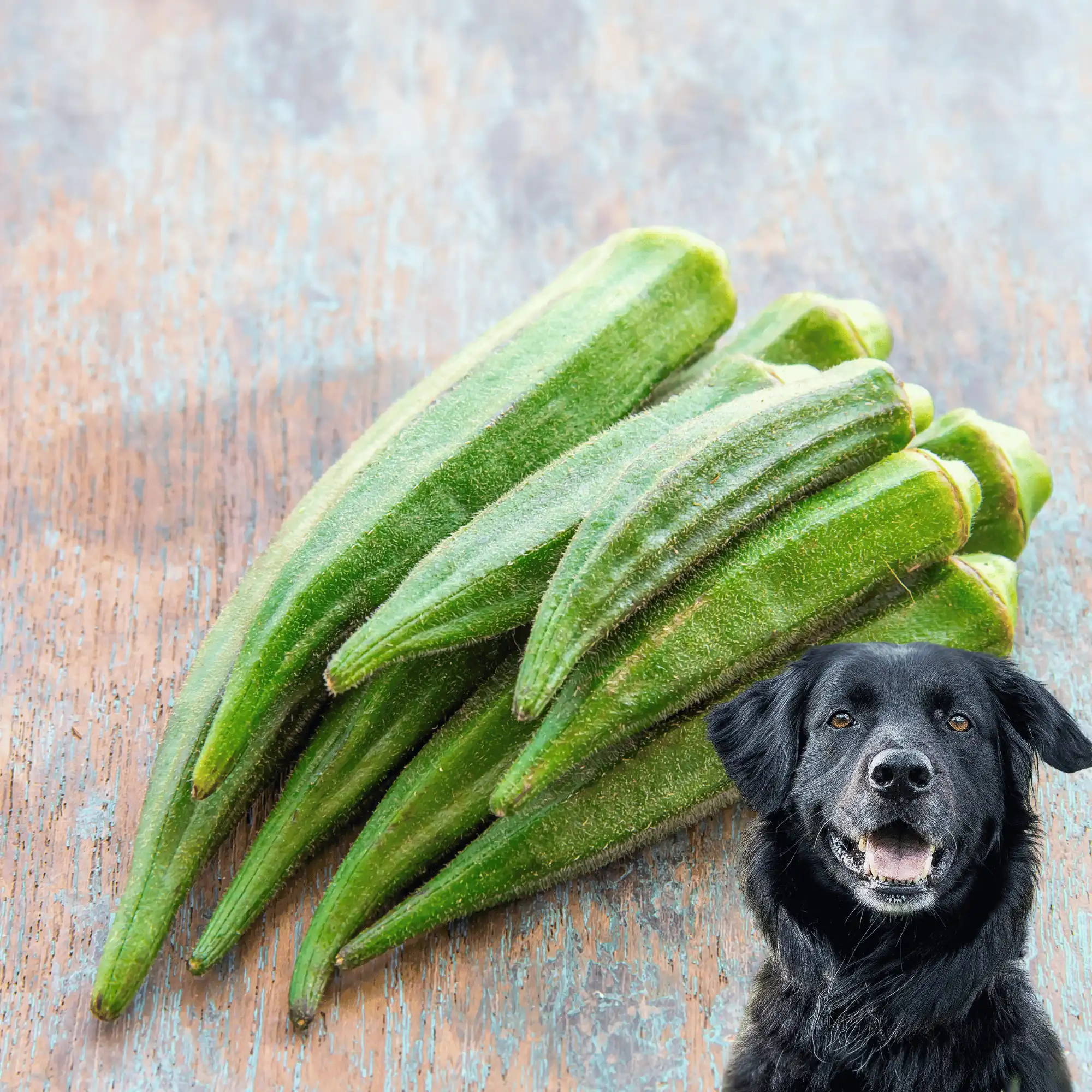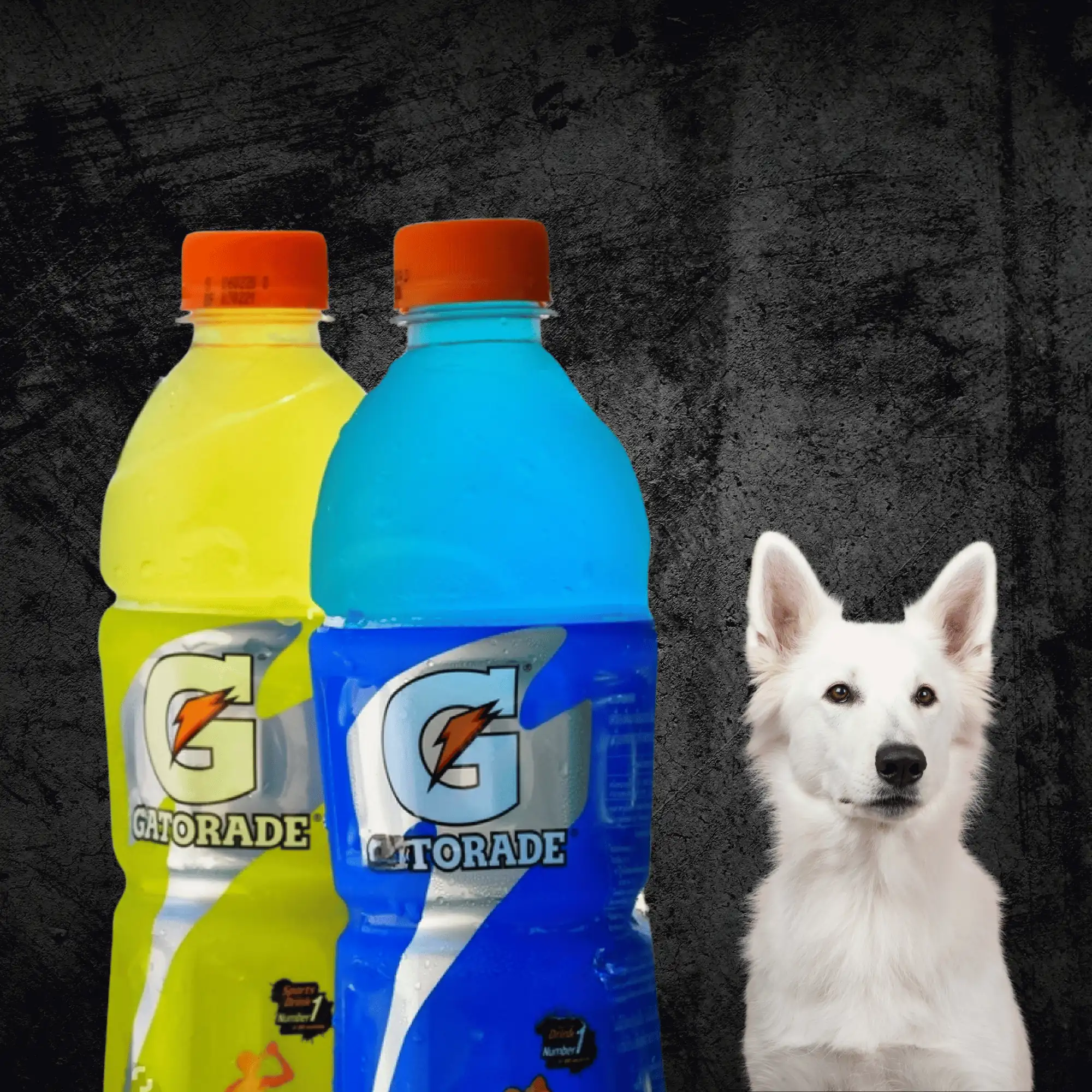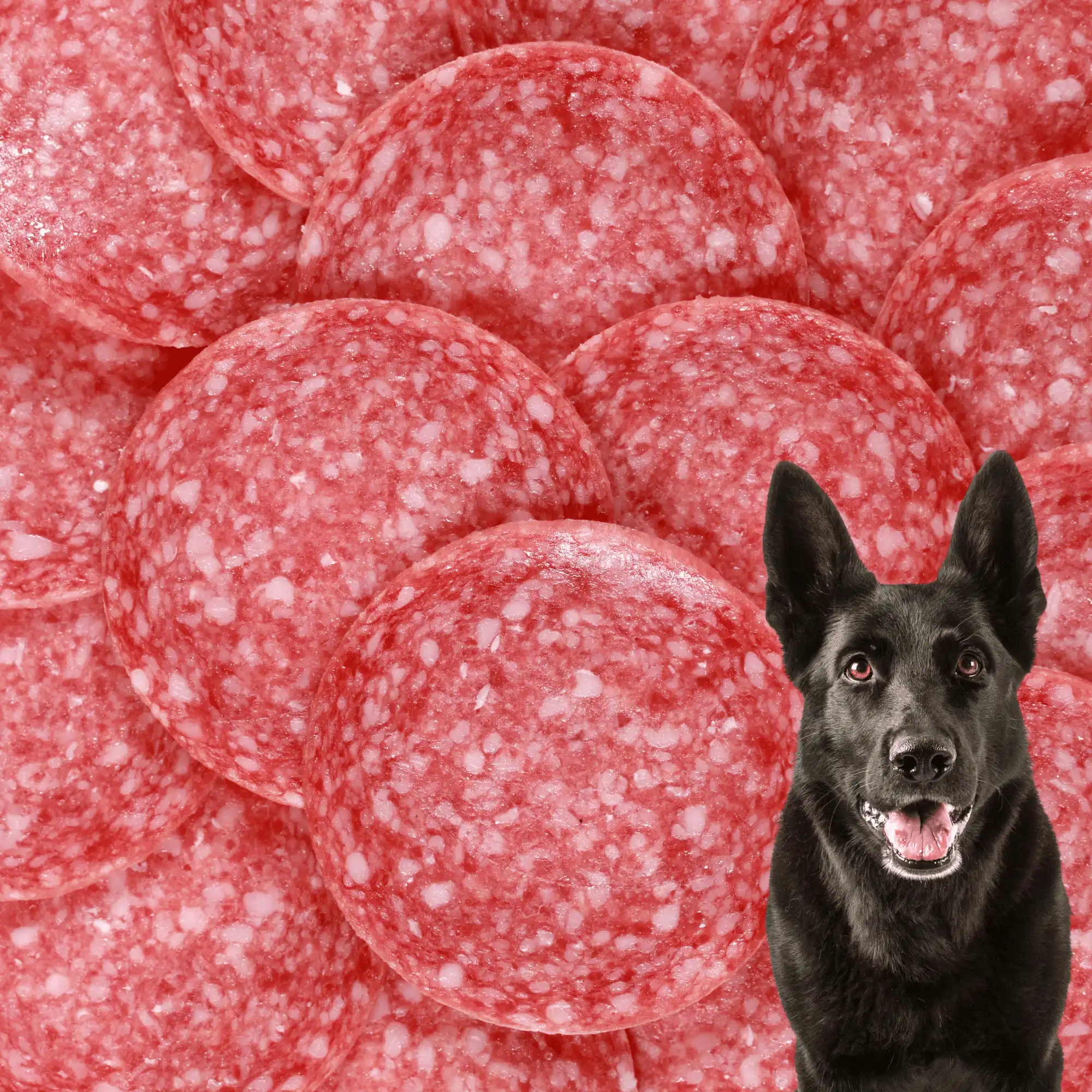For many pet owners, ensuring their furry companions receive a nutritious and balanced diet is a top priority. When it comes to treating our dogs, the question arises: Can dogs eat cottage cheese? The answer is yes.
With its creamy texture and nutritional profile, cottage cheese holds promise as a potential addition to a dog’s diet. However, understanding the safety, benefits, and best practices for feeding cottage cheese to dogs is essential for responsible pet ownership.
In this article, we will delve into the world of cottage cheese for dogs, exploring its safety, potential health benefits, and guidelines for incorporating it into your canine companion’s diet effectively.
Here’s a breakdown of the topics covered in the blog post:
- What is Cottage Cheese?
- Is Cottage Cheese Safe for Dogs to Eat?
- The Nutritional Value of Cottage Cheese for Dogs
- Potential Benefits of Cottage Cheese for Dogs
- Can Dogs Eat Blue Cheese?
- Can Dogs Eat Cream Cheese?
- Potential Risks of Feeding Cottage Cheese to Dogs
- Incorporating Cottage Cheese into Your Dog’s Diet
What is Cottage Cheese?
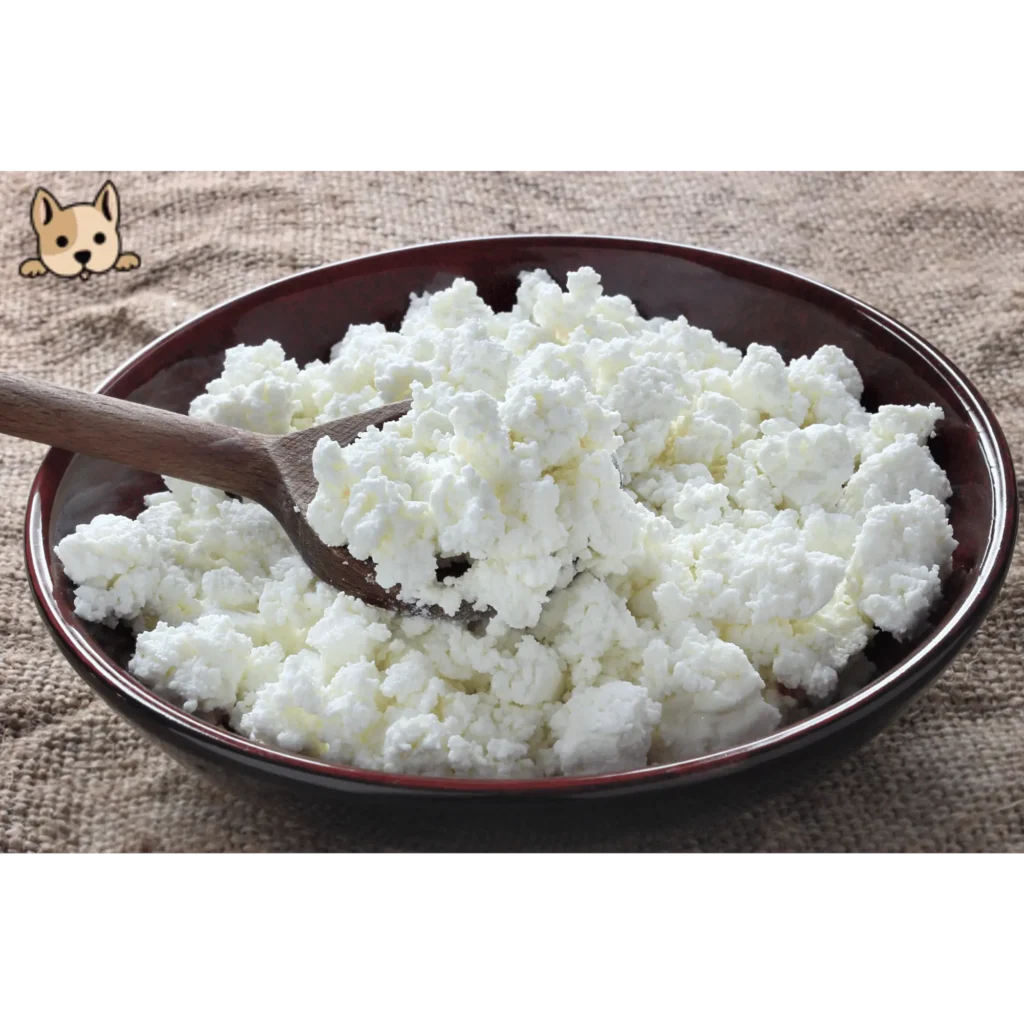
Cottage cheese is a soft, white cheese made from cows’ milk. It’s created by separating the curd from the whey and then rinsing the curds. Sometimes, salt or other flavors are added during the process.
Cottage cheese, also known as Dutch cheese, can be made using skim milk, part-skimmed milk, or whole milk, resulting in different versions like low-fat or full-fat varieties. It comes in various curd sizes, including small, medium, and large curds. People often eat cottage cheese by itself or mix it with fresh fruit for extra flavor and texture.
Is Cottage Cheese Safe for Dogs to Eat?
Cottage cheese can be a safe treat for your dog, especially when they have an upset stomach. Mixing a few spoonfuls of cottage cheese with white rice can make a protein-rich meal that’s gentle on your dog’s stomach.
But keep in mind that dogs don’t have a lot of the enzyme lactase, which helps digest dairy. So, some dogs might not tolerate dairy products well. Cottage cheese has less lactose than other cheeses, but it’s still important to be careful when giving it to your dog.
Start with small amounts of cottage cheese and watch for any signs of tummy trouble. If you’re worried or have questions about giving cottage cheese to your dog, it’s always a good idea to talk to your vet. They can give you the best advice for your puppy’s health.
The Nutritional Value of Cottage Cheese for Dogs:
Cottage cheese, a dairy product made from curds of milk, offers several nutritional benefits that can complement a dog’s diet. Rich in protein, cottage cheese provides essential amino acids necessary for muscle growth, repair, and overall health in dogs.
Additionally, it is a good source of calcium, supporting bone strength and development, which is particularly crucial for growing puppies and senior dogs prone to bone density loss.
Furthermore, cottage cheese is relatively low in lactose compared to other dairy products, making it easier for some dogs to digest, especially those with lactose intolerance.
Cottage cheese’s creamy texture can also make it a palatable option for dogs with dental issues or picky eaters. When fed in moderation and as part of a balanced diet, cottage cheese can be a nutritious addition to a dog’s meals, offering valuable nutrients that contribute to their overall well-being.
Potential Benefits of Cottage Cheese for Dogs:
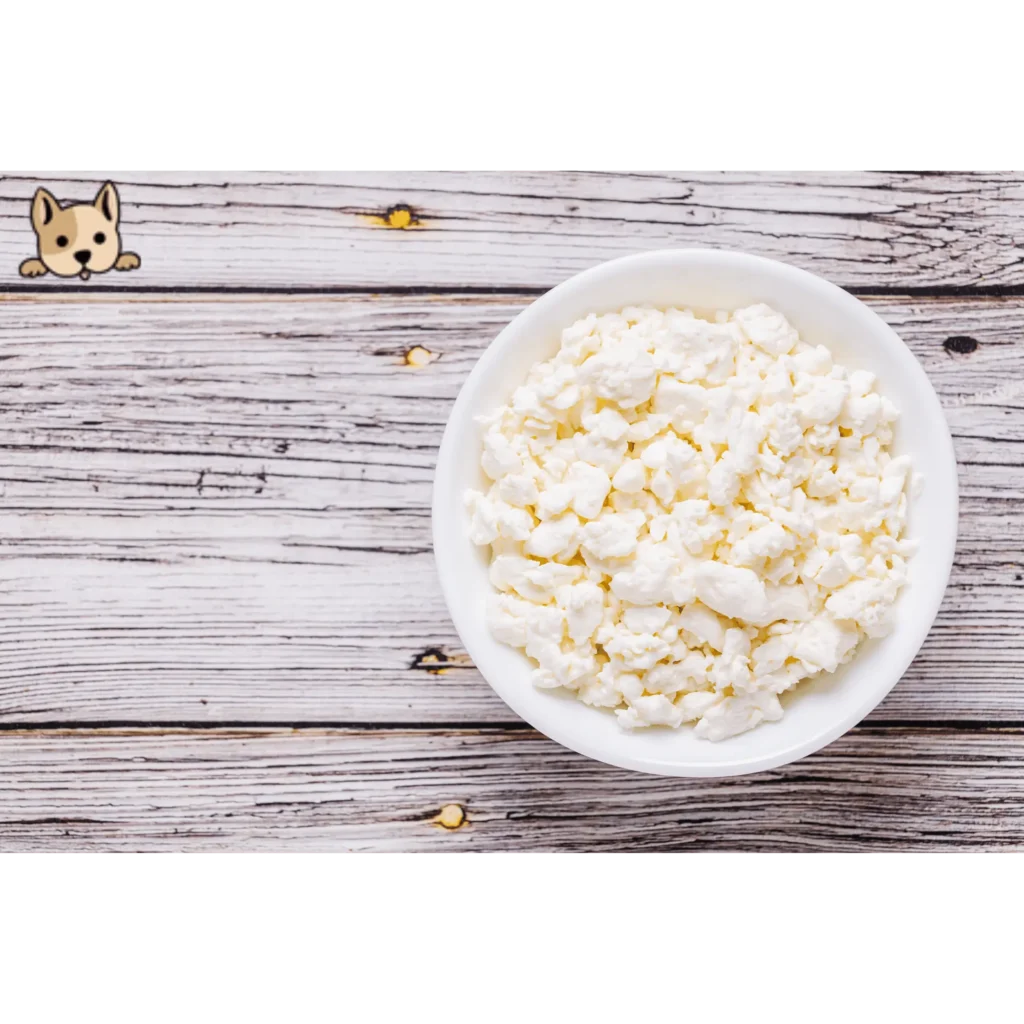
Cottage cheese can offer several potential pros for dogs when incorporated into their diet in moderation:
1. Protein Source:
The protein content in cottage cheese can help maintain your dog’s muscle mass and support their energy needs, especially for active dogs or those undergoing growth and development stages.
It can also be a useful addition for dogs recovering from illness, surgery, or injury, as protein is essential for tissue repair and immune function.
2. Calcium:
Cottage cheese is a good source of calcium, which is an essential mineral for dogs. Calcium plays a vital role in maintaining strong bones and teeth, supporting muscle function, nerve transmission, and blood clotting.
Incorporating cottage cheese into your dog’s diet can help ensure they receive adequate calcium intake, particularly during growth stages such as puppyhood or in senior dogs where bone health may be a concern.
3. Probiotics:
Probiotics are beneficial bacteria that can support gut health and digestion in dogs by promoting a balanced microbial environment in the intestines.
These probiotics can help improve the balance of beneficial bacteria in your dog’s gut, which can aid in digestion, nutrient absorption, and overall gastrointestinal health.
4. Omega-3 Fatty Acids:
Omega-3 fatty acids have anti-inflammatory properties that can help reduce joint inflammation and alleviate symptoms associated with conditions like arthritis or other inflammatory joint diseases. They can help improve mobility and overall joint function in dogs, particularly senior dogs or those with existing joint issues.
Omega-3 fatty acids play a crucial role in maintaining healthy skin and a shiny coat in dogs. They help nourish the skin, reduce inflammation associated with allergic skin conditions, and promote a shiny, lustrous coat.
Omega-3 fatty acids support cardiovascular health in dogs by promoting healthy blood circulation, reducing blood clot formation, and supporting normal heart function.
5. Weight Management:
Cottage cheese is generally lower in fat compared to other cheese varieties. This can be beneficial for overweight or obese dogs as it provides a source of protein with fewer calories from fat, helping to reduce overall calorie intake.
Cottage cheese is nutrient-dense, meaning it provides essential nutrients such as protein, calcium, phosphorus, and vitamins in a relatively low-calorie package. This can be advantageous for weight management diets, as it allows dogs to meet their nutritional needs without consuming excessive calories.
6. Palatability:
The creamy texture of cottage cheese can be enticing for dogs, especially those who enjoy softer foods. This texture can make it easy for dogs to eat and digest, particularly for those with dental issues or older dogs with reduced chewing ability.
Cottage cheese typically has a mild, slightly tangy flavor that is not overpowering. This makes it appealing to dogs with sensitive palates or those who may be picky eaters. The mild flavor allows cottage cheese to be easily mixed with other foods or used as a topping to enhance the taste of meals.
Despite these potential benefits, it’s important to gradually introduce cottage cheese to your dog’s diet, especially if they haven’t had it before, to avoid digestive upset.
Can Dogs Eat Blue Cheese?
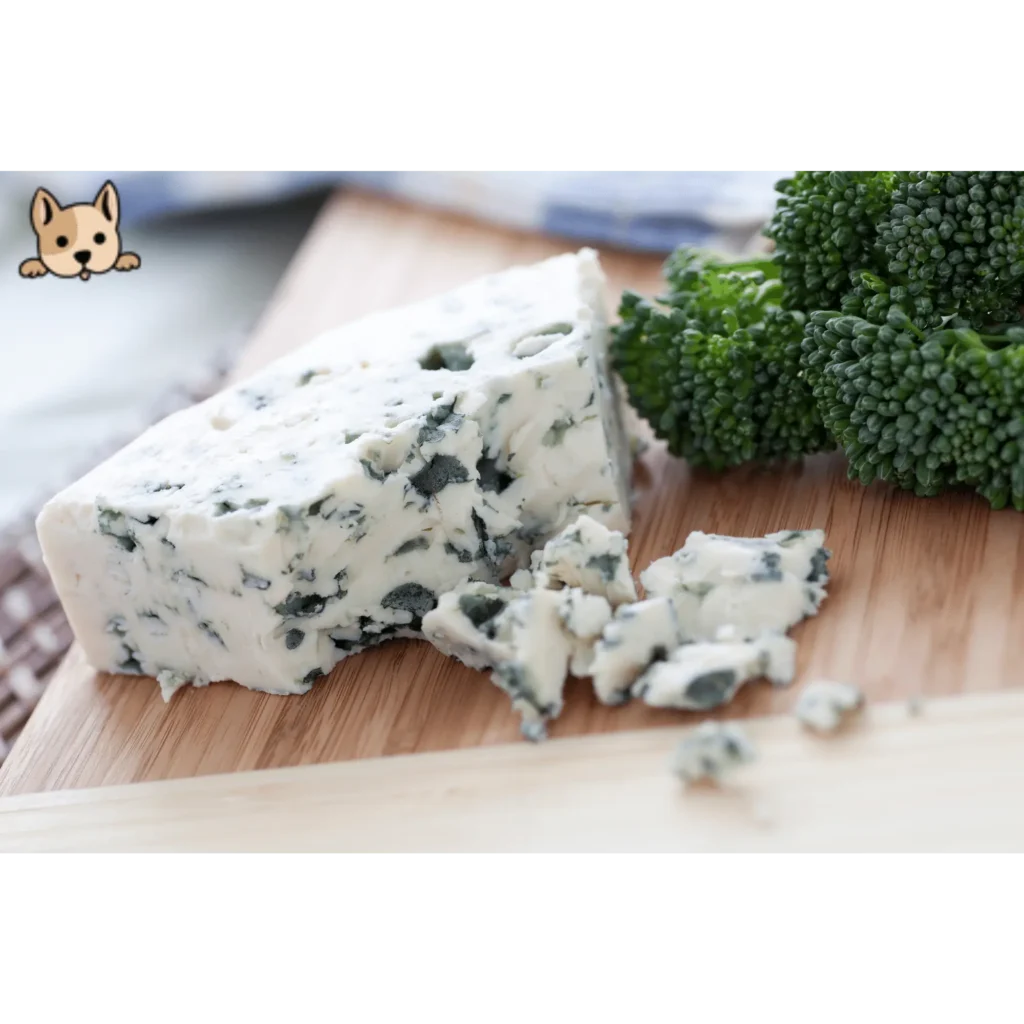
It’s crucial to remember that dogs should never eat blue cheese. Blue cheeses like Stilton can contain a fungus that produces a substance called roquefortine C, which dogs can be highly sensitive to. If your dog eats blue cheese, they might develop symptoms like vomiting, diarrhea, a fever, and even seizures.
The more blue cheese your dog eats, the worse these symptoms can get. So, if you see any signs of distress or illness in your dog after they’ve eaten blue cheese, it’s essential to contact your vet right away. They can check on your dog and provide the necessary treatment.
Can Dogs Eat Cream Cheese?
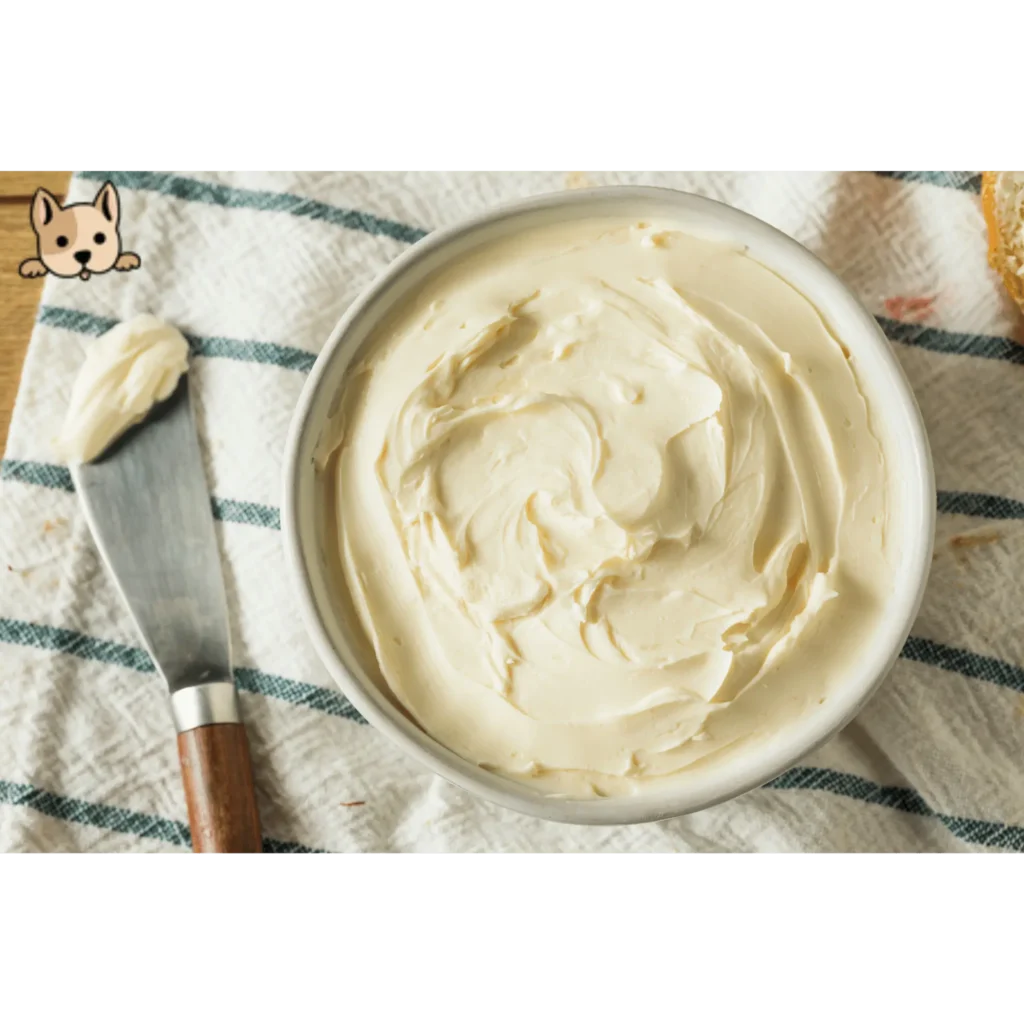
In general, it’s okay for dogs to have a little bit of cream cheese, but it’s important to be careful because it’s high in fat and calories. Too much can make them gain weight.
Also, some kinds of cream cheese might have ingredients like chives, onions, or garlic, which can make dogs sick. These ingredients can cause anything from a tummy ache to serious conditions like anemia. So, it’s best to avoid giving cream cheese with these added ingredients to your dog.
If you do give your dog cream cheese, choose plain kinds without any added flavors or ingredients that might be harmful. And remember, it’s best to give it to them as an occasional treat, not every day. If you’re not sure about giving cream cheese to your dog, talk to your vet for advice.
Risks of Feeding Cottage Cheese to Dogs
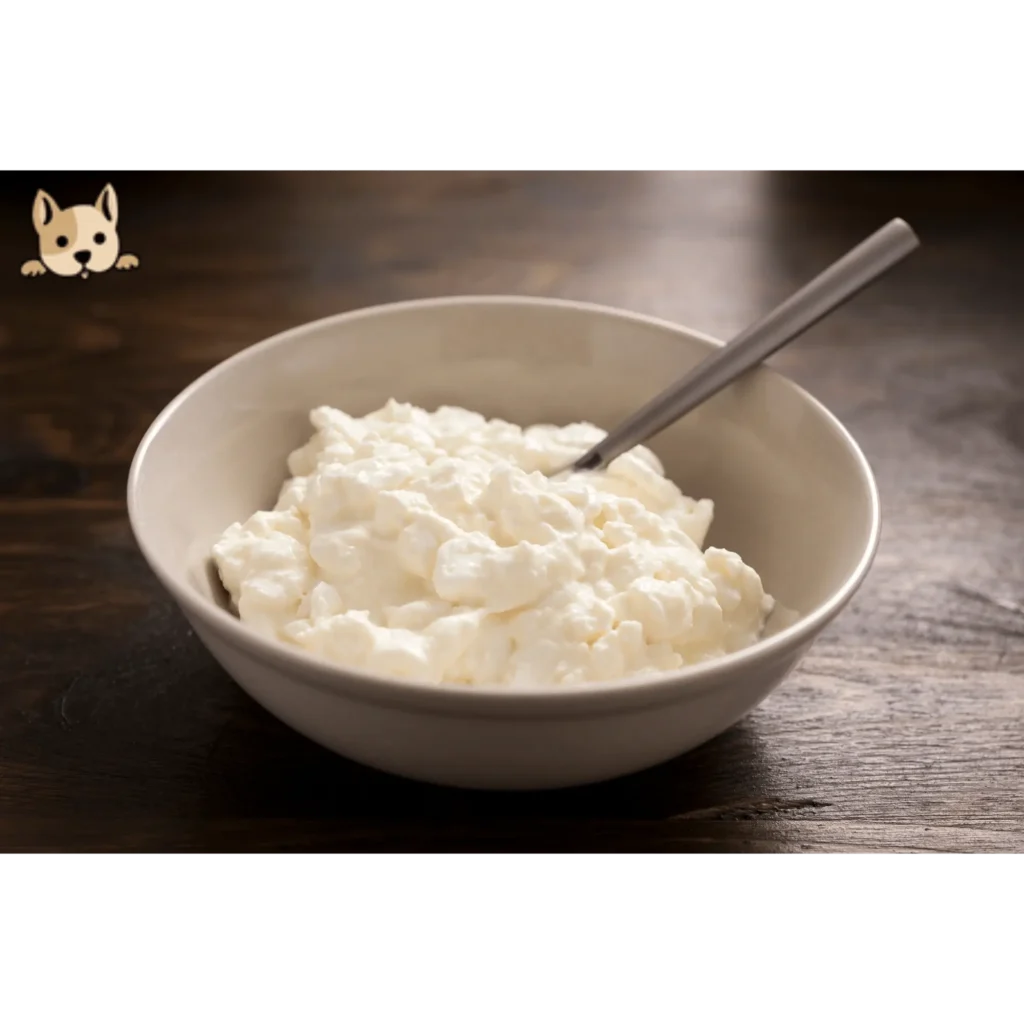
Cottage cheese can indeed offer nutritional benefits for dogs, but it’s crucial to be aware of potential side effects and monitor your pet’s reaction. Here are some considerations:
1. Digestive Issues:
Cottage cheese’s high fat and lactose content can lead to digestive issues in dogs with lactose intolerance or sensitive stomachs. Symptoms such as diarrhea, vomiting, or an upset stomach indicate intolerance, and it’s best to avoid cottage cheese for such dogs.
2. Weight Gain:
Due to its high fat content, excessive consumption of cottage cheese can contribute to weight gain in dogs, especially those prone to obesity. Monitoring portion sizes is essential to prevent weight-related health problems.
3. Allergic Reactions:
Some dogs may be allergic to cottage cheese, showing symptoms like itchiness, hives, swelling, or difficulty breathing. If such signs occur, discontinuing cottage cheese is recommended, and veterinary advice should be sought.
4. Interference with Medications:
Cottage cheese may interfere with the absorption of certain medications or supplements. Consult your veterinarian to ensure it’s safe to include cottage cheese in your dog’s diet if they are on medication.
5. Calcium Imbalance:
Cottage cheese’s high calcium content can be beneficial, but excessive intake may lead to constipation or kidney issues. Monitoring calcium intake, especially if supplementing with cottage cheese, is essential.
While cottage cheese can be a healthy addition to your dog’s diet, introducing it gradually and in moderation is key. Starting with small amounts as an occasional treat allows you to observe any adverse reactions and adjust accordingly. Always consult your veterinarian if you have concerns or notice any negative effects on your dog’s health.
Incorporating Cottage Cheese into Your Dog’s Diet
When you’re giving your dog new foods like cottage cheese, it’s best to take it slow. Start with a tiny bit of plain, low-fat cottage cheese mixed in with their regular food, like a teaspoon or so. This way, you can keep an eye on how they react. Look out for any signs of tummy trouble, like an upset stomach, constipation, gas, diarrhea, or vomiting.
Make sure you choose the right kind of cottage cheese. Go for plain, low-fat types without any extra flavors or too much fat. This helps lower the chance of tummy issues for your dog. And remember, give cottage cheese in small amounts. Even though it can be a healthy treat, too much might upset your dog’s stomach.
If your dog handles the cottage cheese well and doesn’t have any problems, you can keep giving it to them as an occasional treat. But always keep the portions small to avoid tummy issues. If your dog has any bad reactions or if you’re worried about giving them cottage cheese, talk to your vet. They can give you the best advice for your dog’s diet.
By taking these steps and watching how your dog reacts, you can safely give them cottage cheese as a special treat without worrying too much about tummy troubles.
Final Thought:
In conclusion, cottage cheese can be a safe and nutritious treat for dogs when introduced gradually and in moderation. It offers several potential health benefits, including being a good source of protein, calcium, probiotics, and omega-3 fatty acids. However, it’s essential to be mindful of potential risks, such as digestive issues, weight gain, allergic reactions, and calcium imbalances.
When feeding Dutch cheese to your dog, choose plain, low-fat varieties without added ingredients like chives, onions, or garlic. Monitor your dog for any adverse reactions, and consult your veterinarian if you have concerns or notice any negative effects on your dog’s health.
By following these guidelines and incorporating cottage cheese responsibly into your dog’s diet, you can provide them with a tasty and nutritious treat that supports their overall well-being. As with any dietary changes or additions, always prioritize your dog’s health and consult with your veterinarian for personalized advice. With proper care and attention, cottage cheese can be a delicious and beneficial addition to your dog’s diet, keeping them happy and healthy for years to come.
FAQs:
How much cottage cheese can you give your dog?
- Yes, you can give your dog cottage cheese, and they’ll probably enjoy it.
- A safe amount is about 3 ounces of cottage cheese per day for every 25 pounds of body weight.
- Cottage cheese is beneficial for dogs because it’s rich in protein, vitamins, and minerals, and it supports gut health.
Which is more beneficial for dogs: yogurt or cottage cheese?
Cottage cheese is more beneficial for dogs than yogurt. Cottage cheese contains 28 grams of protein, which is 25% more protein than Greek yogurt! With an excellent amino acid score of 158, cottage cheese provides all the essential amino acids in the right proportions, making it a high-quality protein source.
What kind of cheese is safe for dogs?
Mozzarella and cottage cheese are lower in fat compared to other cheeses, making them suitable snacks for dogs. Swiss cheese has a lower lactose content, making it easier on your pet’s digestive system. Cheddar, a common household cheese, has relatively low salt levels, making it safe for dogs in small doses.
Can I feed my dog cottage cheese every day?
According to the ASPCA, you can safely add a small amount of cottage cheese to your dog’s regular diet of canned and dry dog food. However, it’s essential to limit it to no more than 10 percent of your dog’s overall diet. Dogs with specific health conditions or food allergies should avoid cottage cheese.



